Most new moms are familiar with the importance of nutrients like iron and folate during pregnancy—but vitamin D often gets overlooked in the postpartum period. And yet, vitamin D deficiency postpartum is incredibly common and can have a major impact on everything from your mood to your energy levels, immune system, and even your hair.
If you’re feeling off after birth—think fatigue, low mood, hair loss, or frequent illness—low vitamin D postpartum might be part of the puzzle.
In this post, we’re diving into:
- Why vitamin D is important for females (especially postpartum!)
- Symptoms of low vitamin D
- The link between vitamin D and postpartum depression
- How it affects hair loss, gut health, and breastfeeding
- The best way to supplement safely (especially when combined with magnesium)
Why Is Vitamin D Important for Females—Especially Postpartum?
Vitamin D is a fat-soluble vitamin that functions more like a hormone in the body. It plays a vital role in calcium absorption, bone health, immune function, hormone regulation, and even mood stability.
During pregnancy, your baby draws heavily on your vitamin D stores. If you enter the postpartum period already deficient—which is common—those low levels can get even worse.
Add limited sunlight exposure, long days indoors with your newborn, and increased nutrient demands while breastfeeding, and it’s no wonder many women become deficient.
Vitamin D and Breastfeeding Moms
Vitamin D for breastfeeding moms isn’t just about your health—it’s also about your baby’s. Babies rely on your breast milk to get enough vitamin D, but most moms don’t have sufficient levels to meet that need naturally.
That’s why pediatricians often recommend vitamin D drops for breastfed infants. But the truth is, if a mom takes enough vitamin D herself (usually up to 6,400 IU/day), it can transfer into her milk—eliminating the need for separate drops.
That’s why vitamin D supplementation and breastfeeding go hand in hand. You’re not only supporting your body, but giving your baby a head start too.
Symptoms of Low Vitamin D
Not sure if your vitamin D levels are low? Here are some of the most common symptoms of vitamin D deficiency:
- Fatigue or exhaustion
- Low immunity or frequent colds
- Muscle weakness or body aches
- Hair thinning or postpartum hair loss
- Bone pain or brittle nails
- Mood changes or postpartum depression
- Sleep disturbances
- Brain fog or difficulty concentrating
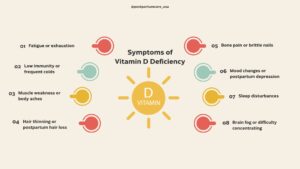
When Jenna came to us three months postpartum, she chalked her exhaustion up to sleepless nights with a newborn. But when even short walks left her feeling wiped out and her hair started falling out in clumps, she knew something wasn’t right. Her lab results revealed low vitamin D—despite taking a supplement. With a personalized protocol and the right dose, her energy, mood, and hair health gradually improved.
These symptoms often overlap with general postpartum recovery, so vitamin D deficiency postpartum can go unnoticed unless you test for it.
Vitamin D and Postpartum Depression
Here’s a big one: the connection between vitamin D and postpartum depression is well-supported in scientific research. Several studies have found that low vitamin D levels are associated with an increased risk of depressive symptoms in postpartum women.
A 2018 meta-analysis published in Nutrients reviewed multiple studies and concluded that women with vitamin D deficiency were significantly more likely to experience postpartum depression. Researchers noted that insufficient vitamin D may impair neurological and hormonal functions critical for mood regulation and emotional stability.¹
That’s because vitamin D plays a role in:
- Regulating serotonin, a key mood-balancing neurotransmitter
- Supporting brain health and hormone balance
- Reducing inflammation, which is often elevated in depression
If you’re feeling emotionally flat, anxious, or disconnected after birth, it’s worth exploring your vitamin D status as part of a larger hormone and nutrient panel. Testing and targeted support can make a world of difference.
Vitamin D Postpartum Hair Loss: What’s the Connection?
Hair loss is one of the most common complaints postpartum—and while hormonal shifts are a major cause, low vitamin D can make it worse. This vitamin plays a role in hair follicle cycling and growth, and deficiency has been linked to hair thinning and shedding.
If your hair is falling out in clumps or not regrowing as expected, it may be time to check both your vitamin D and iron levels (another common postpartum deficiency).
Vitamin D and Gut Health
Have you been feeling more bloated than usual?
You’re not alone—and your gut health might be playing a bigger role than you think. What many postpartum moms don’t realize is how closely vitamin D levels and gut health are connected.
Low vitamin D has been linked to leaky gut and even inflammatory bowel conditions. And here’s the kicker: in order to properly absorb and use vitamin D, your gut microbiome needs to be functioning well.
If you’re dealing with bloating, fatigue, low immunity, or that “off” feeling that just won’t go away, your gut could be struggling—and pulling your vitamin D levels down with it.
The good news? When you support both your gut health and vitamin D levels, it can make a powerful difference in how you feel—physically and emotionally. It’s all connected.
Vitamin D and Magnesium: The Power Combo
Did you know that magnesium is essential for activating vitamin D in the body? If you’re taking vitamin D supplements but still not seeing improvements, you might be low in magnesium too.
Together, vitamin D and magnesium help regulate mood, reduce inflammation, improve sleep, and support hormone balance. We recommend supplementing both—especially postpartum, when depletion is common.
Best Way to Supplement Vitamin D Postpartum
Here’s what to keep in mind when supplementing:
1. Test—Don’t Guess
Ask your provider for a 25(OH)D blood test to determine your current levels. The ideal range for most women is between 40–80 ng/mL.
2. Choose the Right Dose
For maintenance, many postpartum women need 2,000–5,000 IU/day. If you’re breastfeeding and want to skip infant drops, 6,400 IU/day has been shown to safely provide your baby with what they need.
3. Pair with K2
Choose a supplement that includes vitamin K2, which helps direct calcium to the bones and away from arteries.
4. Take With Fat
Vitamin D is fat-soluble, so take it with a meal that includes healthy fats (like avocado or nut butter) for best absorption.
5. Support with Magnesium
Add magnesium glycinate (300–400 mg/day) to support vitamin D activation and ease symptoms like anxiety, cramps, or insomnia.
Note: Always consult with your healthcare provider before beginning any new supplements, especially postpartum.
The Moral of the Story: Vitamin D Is Essential for Postpartum Recovery
If you’re feeling off after birth, don’t write it off as “just new mom life.” Vitamin D deficiency postpartum is extremely common—and treatable. From boosting mood and immunity to supporting your baby and balancing your hormones, vitamin D plays a vital role in your recovery.
Want to know where your levels stand?
At Postpartum Care USA, we offer advanced lab testing and personalized postpartum recovery plans to help you get to the root cause of your symptoms.
👉 Click here to schedule a consultation and learn how we can support your healing journey—one nutrient at a time.
¹ Reference:
Zhou, Q., et al. (2018). Association between vitamin D status and risk of postpartum depression: A systematic review and meta-analysis of observational studies. Nutrients, 10(4), 442. https://doi.org/10.3390/nu10040442
Pin This for Later:
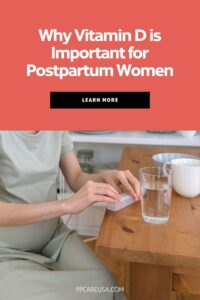
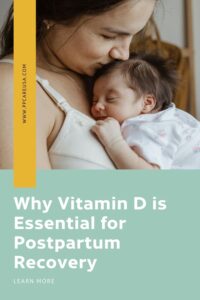
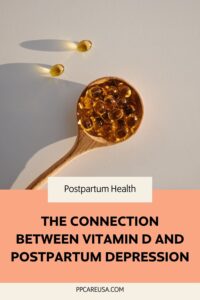
Postnatal Depletion
Meet the Team
Our Services
Supplements
A virtual healthcare clinic that helps postpartum mamas recover from postnatal depletion syndrome with a holistic approach.
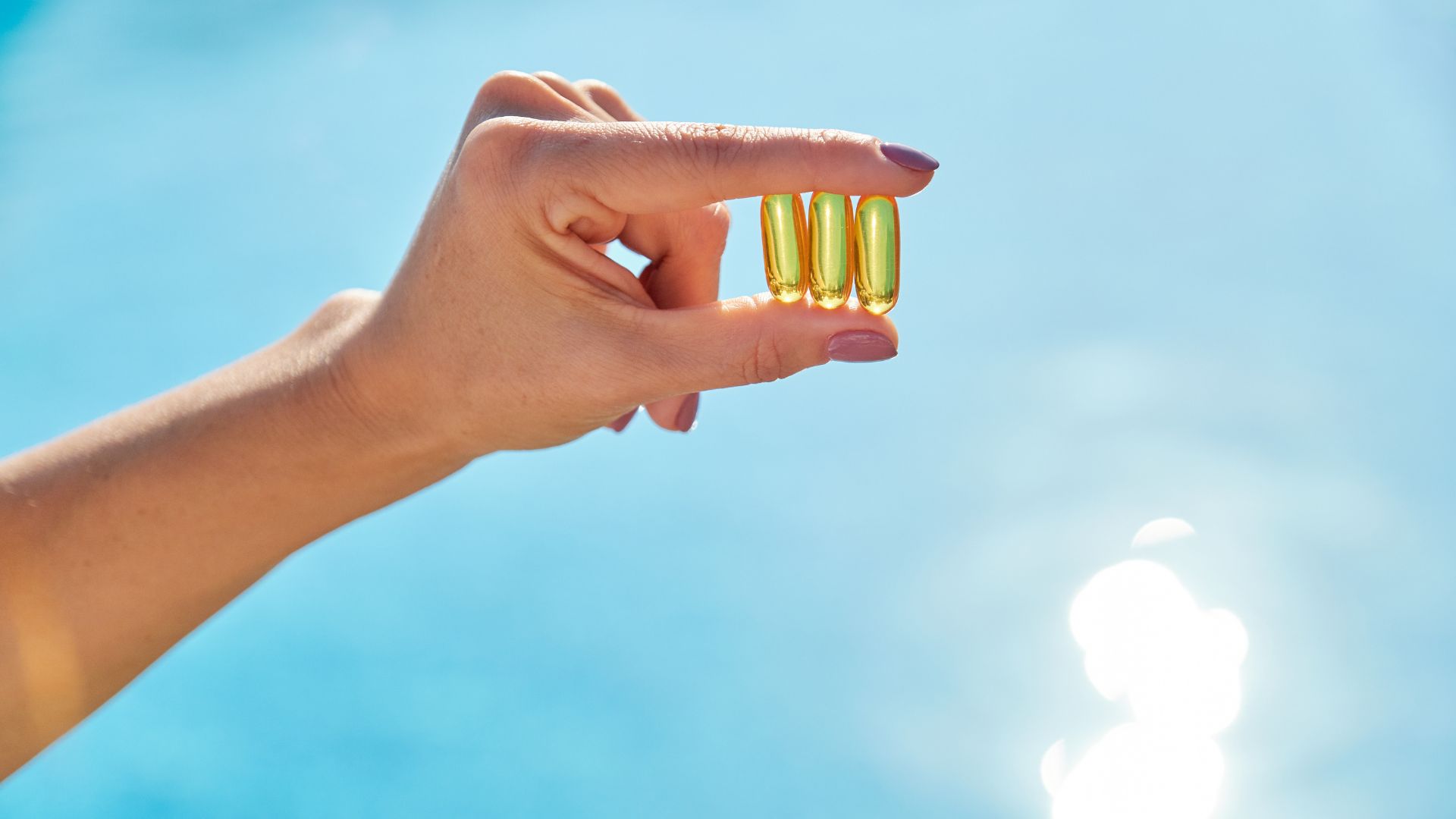
Get in touch